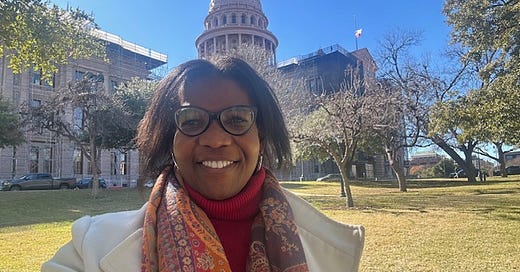Photo Description: The author is smiling, wearing her new favorite orange and red scarf around her neck, a red turtleneck, and a cream pea coat. She is standing in front of the Texas State Building after finishing an advocacy and policy training session.
January 2025, Part Two
Below is an excerpt from Chapter 2: Personal as Political. I would love to hear your thoughts or feedback in the comments!
I am a full citizen of the United States
I live in an integrated neighborhood
I can speak any language in school
I have my own checking account
My child attends their zoned school
I attend the religious institution of my own choosing
All of these are part of my identity and they are only true because of a governing body passed a law that required them to be true. There was a time in United States History when none of these statements could be applicable to me because laws and policies would not allow it.
I am a full citizen of the United States (race)
The law that changed the status of Black people from being counted as three-fifths of a person to full citizens was the 14th Amendment to the United States Constitution, ratified in 1868 (U.S. Const. amend. XIV). The "Three-Fifths Compromise," outlined in Article I, Section 2 of the U.S. Constitution, originally counted enslaved people as three-fifths of a person for the purposes of taxation and representation in Congress (U.S. Const. art. I, § 2). The 14th Amendment nullified this provision by granting citizenship to "all persons born or naturalized in the United States," including formerly enslaved individuals, and guaranteed "equal protection of the laws" (U.S. Const. amend. XIV, § 1) (Foner, 1988).
I live in an integrated neighborhood (race)
The key law that prohibited racial discrimination in housing and allowed Black Americans to live in any neighborhood of their choosing was the Fair Housing Act of 1968, passed as Title VIII of the Civil Rights Act of 1968 (42 U.S.C. §§ 3601-3619). This legislation made it illegal to refuse to sell, rent to, or negotiate housing with any person because of their race, color, religion, sex, or national origin (Rothstein, 2017).
I can speak any language in school (language)
The right to speak any language in school in the United States is primarily protected by the Bilingual Education Act of 1968 (Title VII of the Elementary and Secondary Education Act, Pub.L. 90–247) and later supported by the Equal Educational Opportunities Act (EEOA) of 1974 (20 U.S.C. § 1703). The Bilingual Education Act was the first federal law to recognize the needs of students with limited English proficiency (LEP), promoting programs to support bilingual education (Crawford, 2004).
Keep reading with a 7-day free trial
Subscribe to Leading-Within to keep reading this post and get 7 days of free access to the full post archives.




